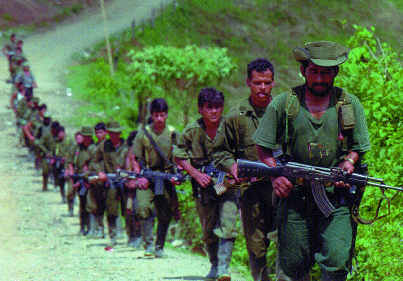Cultures
What the Columbia peace deal means for the drug trade

Image:Wikipedia
In Columbia, the government seems poised to finally make a lasting peace with the FARC rebel group, ending a civil war that has been going on for close to fifty years.
The Fuerzas Armadas Revolucionarias de Colombia, or Revolutionary Armed Forces of Columbia in English, better known by its Spanish acronym, is composed of leftist guerillas who have been at war with Government and paramilitary forces since the end of a period of political upheaval known as La Violencia in Columbia.
International observers are hopeful that this latest peace deal will finally put an end to a conflict that has resulted in shocking acts of violence by both sides. Yet there is another problem that lurks beneath the public gaze in this peace deal, and that is what it means for the future of Columbia’s drug trade.
The Netflix show “Narcos” has familiarized many with the life of Pablo Escobar, a notorious Columbian drug lord who helped make Columbia the cocaine capital of the world. But what many don’t know is that following the fall of Escobar, it was the FARC that took over much of Columbia’s drug trade.
Today, 70% of all cocaine manufactured in the country is under the control of the group which contributes close to 40% of all cocaine on the global market. It is a relationship which has led many to call FARC the single most important player in the international cocaine trade.
Of course, FARC’s domination of the Cocaine trade in Columbia relies on the fact that they control large areas in the remote hinterlands of Columbia where they are able to oversee the production of huge Coca crops. With the disarming that will accompany the peace deal, it is likely that FARC will no longer be able to maintain their lucrative monopoly on the Columbian cocaine trade, which leaves it wide open for international and domestic groups seeking their own cut of the profits.
There are a few possibilities. First, elements of FARC may decide that peace is far less lucrative than war and decline to disarm, instead forming their own group or continuing their fight against the government on their own.
Also possible is international cartel groups moving in on the former turf of FARC. The Mexican cartels already have close ties to Columbia’s drug-lords and might find it a convenient time to establish more direct control over the drug trade in the area.
Finally, domestic criminal organizations may have the same idea. Despite the fall of Escobar, armed cartels within Columbia are still alive and well, and though they have for several years been content to peacefully share the profits of the illegal trade, such a large percentage of the Cocaine supply coming onto the market may inspire a gold rush of sorts as domestic criminal groups vie for control.
Unfortunately for Columbia and the rest of the world, it is unlikely that the supply of Cocaine is going to dry up anytime soon.





0 comments